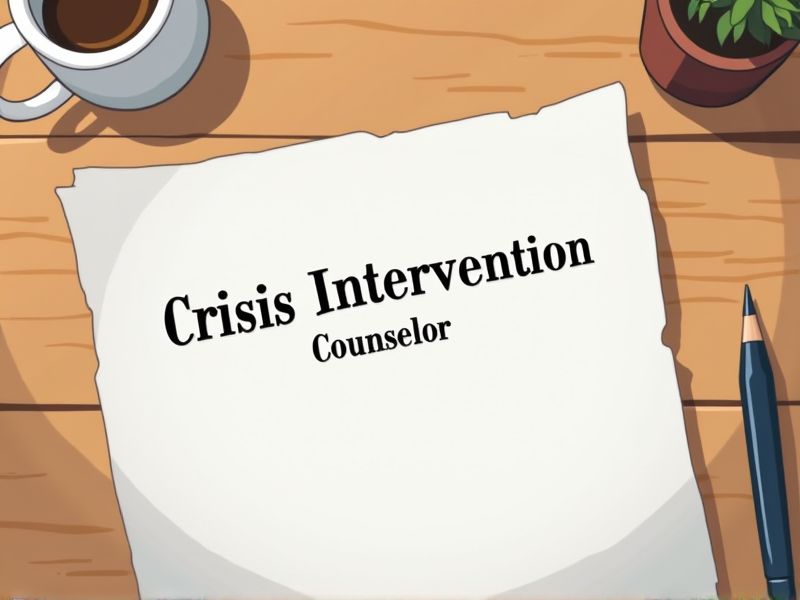
Crisis Intervention Counselors face intense situations requiring specialized skills to effectively manage and support individuals in distress. Certain certifications provide these professionals with validated techniques and tools that enhance their competence and confidence in handling emotional and psychological crises. Certification ensures that counselors adhere to industry standards and ethical guidelines, significantly impacting the counselor's ability to offer high-quality care. Here are some essential certifications you might need as a Crisis Intervention Counselor.
Certified Crisis Intervention Counselor (CCIC)
The presence of a Certified Crisis Intervention Counselor (CCIC) ensures that individuals facing immediate psychological distress receive timely and effective support grounded in proven techniques. Certification validates the counselor's ability to assess and address various crisis situations, mitigating potential harm and encouraging resolution. Trained CCICs bring a standardized level of expertise, which is crucial for maintaining consistency and reliability in crisis intervention services. The CCIC credential reassures clients and organizations of a counselor's commitment to ethical practices and ongoing professional development.
Crisis Intervention Life Support (CILS) Certification
Crisis Intervention Life Support (CILS) Certification ensures that crisis intervention counselors possess the necessary skills to effectively manage emergency situations, potentially saving lives. This certification provides a standardized framework, which enhances the counselor's ability to deliver timely and appropriate responses. Data suggests that standardized training improves both the confidence and competence of professionals in high-pressure environments. Certified counselors are more likely to gain trust from clients and colleagues, reinforcing their credibility in crisis scenarios.
Psychological First Aid (PFA) Certification
Psychological First Aid (PFA) certification equips crisis intervention counselors with essential skills to effectively address immediate emotional and psychological needs in high-stress situations. By understanding PFA techniques, counselors can provide support that stabilizes individuals, reducing the likelihood of developing long-term mental health issues. Recognizing signs of distress quickly allows counselors to intervene promptly and appropriately, fostering resilience and coping mechanisms. Certification ensures a standardized approach, leading to more consistent and reliable care across different crisis scenarios.
Crisis Prevention Intervention (CPI) Certification
Crisis Prevention Intervention (CPI) Certification provides counselors with evidence-based strategies to safely manage and de-escalate crises. Effective crisis intervention requires understanding nonverbal cues and developing skills to reduce the risk of harm to both clients and counselors. Trained counselors can establish a safer environment by using CPI techniques to prevent potentially dangerous situations from escalating. Certification enhances professional credibility and ensures compliance with industry standards for crisis management.
Mental Health First Aid Certification
Mental Health First Aid Certification equips a counselor with the essential skills to identify early signs of mental health issues. This timely detection can lead to quicker interventions, potentially preventing more severe crises from developing. The training enhances a counselor's ability to approach individuals with empathy and understanding, fostering trust and better communication. Certification also ensures that counselors are up-to-date with the latest strategies and knowledge in mental health care.
Certified Mental Health Counselor (CMHC)
Certified Mental Health Counselors play a critical role in crisis intervention by using specialized training to assess and de-escalate situations effectively, which reduces the risk of harm. Their expertise in therapeutic techniques enables them to provide immediate emotional support, facilitating quicker recovery for individuals in distress. With their knowledge of mental health disorders, they can accurately identify underlying issues, ensuring appropriate referrals and long-term care interventions are made. CMHCs operate with an in-depth understanding of legal and ethical guidelines, which ensures that interventions are conducted safely and within established frameworks.
Certified Clinical Trauma Professional (CCTP)
Crisis Intervention Counselors encounter individuals experiencing acute emotional distress, and a Certified Clinical Trauma Professional (CCTP) designation equips them with advanced techniques to manage such situations effectively. Trauma-informed approaches ensure that underlying trauma impacts are acknowledged and addressed, reducing the risk of re-traumatization during intervention. The CCTP training provides counselors with a comprehensive understanding of the neurobiological effects of trauma, enhancing their ability to formulate effective interventions. Possessing this certification signals a higher qualification, promoting trust and credibility among clients and stakeholders in crisis management scenarios.
Certified Peer Support Specialist (CPSS)
Certified Peer Support Specialists (CPSS) provide unique insights through lived experiences, which can enhance empathy and understanding in crisis intervention. They help build trust and rapport quickly, often leading to more effective communication with individuals in distress. Their presence can reduce the stigma associated with seeking help, encouraging individuals to engage more openly in the intervention process. CPSS involvement often leads to improved outcomes in mental health interventions by offering relatable support and hope to those in crisis.
Advanced Crisis Intervention Training (ACIT)
Advanced Crisis Intervention Training (ACIT) equips counselors with specialized skills to handle complex crisis situations. Enhanced training allows counselors to identify and address deeper psychological issues, leading to more effective interventions. ACIT provides up-to-date techniques that are essential for adapting to the evolving nature of crises. Comprehensive knowledge gained through ACIT strengthens the counselor's ability to ensure client safety and improve outcomes.
Certified Addiction Counselor (CAC)
The Certified Addiction Counselor (CAC) credential ensures that a counselor possesses specialized knowledge to effectively address substance-related issues during a crisis. This certification equips counselors with the skills to identify and manage the complex dynamics of addiction, which may exacerbate a crisis situation. Awareness of the nuances in addiction allows the counselor to implement intervention strategies that are more likely to prevent harm. A CAC enables collaboration with other healthcare professionals, ensuring a comprehensive approach to crisis resolution.
Summary
When you obtain certifications as a Crisis Intervention Counselor, your proficiency and credibility in the field are significantly enhanced. These credentials can lead to increased trust from clients and employers, opening up more job opportunities and career advancements. Certification often equips you with advanced skills, allowing for more effective intervention strategies. As a result, your ability to manage high-pressure situations improves, positively impacting both client outcomes and your professional growth.
